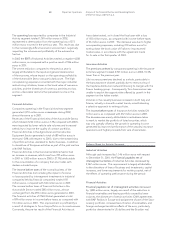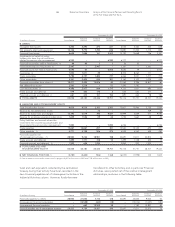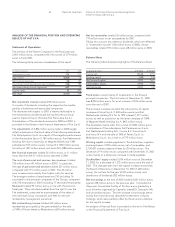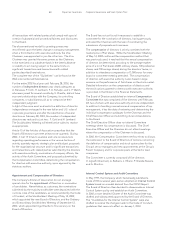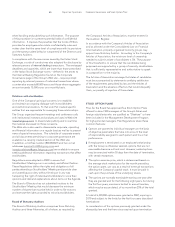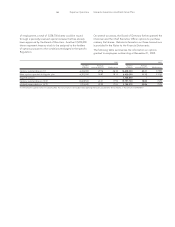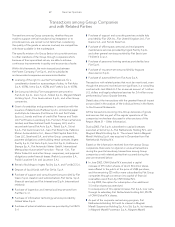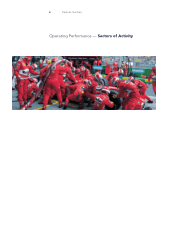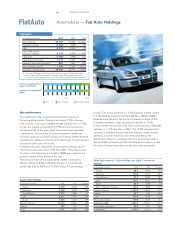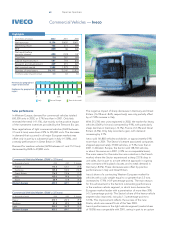Chrysler 2002 Annual Report Download - page 41
Download and view the complete annual report
Please find page 41 of the 2002 Chrysler annual report below. You can navigate through the pages in the report by either clicking on the pages listed below, or by using the keyword search tool below to find specific information within the annual report.
39 Report on Operations
Significant Events Occurring Since the End
of the Fiscal Year and Business Outlook
SIGNIFICANT EVENTS OCCURRING SINCE THE END OF
THE FISCAL YEAR
The most significant transactions completed by the Fiat Group
during the early months of 2003 are reviewed below.
❚Iveco signed an agreement to sell 100% of Fraikin’s share
capital to Eurazeo.
This transaction will produce an improvement of about 450
million euros in the net financial position of the Fiat Group.
❚Business Solutions S.p.A. agreed to sell to Risanamento S.p.A.
(Zunino Group) a package of properties and equity
investments in real estate companies that includes an interest
of about 56% in IPI S.p.A.
This sale produced an improvement of about 120 million
euros in the net financial position of the Fiat Group.
❚On March 11, 2003, Fiat signed an agreement with Capitalia,
Banca Intesa, Sanpaolo IMI and Unicredito whereby Fiat sold
to these four banks a 51% interest in Fidis Retail Italia (“FRI”),
a Fiat Group company that provides credit to consumers in
Europe for the purchase of motor vehicles.
This transaction is part of the program launched by Fiat
to improve its financial position in accordance with the
provisions of the framework agreement signed by Fiat and
the four banks on May 27, 2002. The sale of the interest in FRI
will enable the Fiat Group to reduce its gross consolidated
indebtedness by about 6 billion euros.
❚In March 2003, Standard & Poor’s Rating Services assigned
aBB+ rating with negative outlook to Fiat’s long-term debt.
On the same occasion, Standard & Poor’s lowered the rating
of Fiat’s short-term paper from A-3 to B. In the same month,
Fitch Ratings lowered its rating of Fiat’s medium term debt
from BBB- to BB+ and of Fiat’s short-term debt from F3 to
B. Furthermore, on December 23, 2002, Moody’s Investors
Service had lowered its rating of Fiat’s medium-term debt
from Baa3 to Ba1. The rating of Fiat’s short-term paper was
cut from Prime-3 (P-3) to Not Prime, with negative outlook.
❚On March 22, 2003 the Board of Directors accepted the
binding offer presented by the De Agostini Group for the
purchase of 100% of Toro Assicurazioni. The transaction is
worth 2.4 billion euros and it will cut the Group’s net debt
by about 1.4 billion euros.
❚Further to the agreement reached in December 2002, at
the end of March Fiat finalized the sale of the retail financing
business of Fiat Auto Holdings in Brazil to the Itaú Group,
aleading Brazilian financial institution.
❚The following new products were introduced during the first
quarter of 2003:
– Fiat Auto chose the 73rd International Geneva Motor
Show for the worldwide introduction of the Fiat Gingo
and Fiat Idea.
The Fiat Gingo, a new entry in the subcompact segment, is
the most sophisticated city car available to motorists today.
The Fiat Idea combines the driveability and small size of
acompact car with the versatility of a true multipurpose
vehicle.
– Alfa Romeo introduced new versions of the Alfa Spider
and Alfa GTV and staged the worldwide launch of the
new Alfa GT Coupé.
– Lancia presented the new Ypsilon, a model that combines
outstanding styling with leading-edge technology, to
customers around the world.
❚Changes in Corporate Offices
At the meeting held on February 28, 2003, upon being
informed of Paolo Fresco’s decision to resign the posts of
Director and Chairman, the Board of Directors coopted
Umberto Agnelli and appointed him Chairman.
The Board also accepted the resignations of Felix G. Rohatyn
and John F. Welch. It then coopted Giuseppe Morchio,
appointing him to the post of Chief Executive Officer, and
Luca Cordero di Montezemolo. The Board also named
Alessandro Barberis Vice Chairman in place of Franzo Grande
Stevens, who will continue to serve as a Director.
BUSINESS OUTLOOK
The economic outlook for the balance of 2003 calls for the
continuation of highly unsettled and volatile conditions in the
international markets. The reluctance of consumers to spend
and businesses to invest, coupled with the increasingly limited
room still available to implement stimulative fiscal and economic
policies both in Europe and the United States, points to the
likelihood of a period of stagnation and, possibly, a further
contraction of demand in the main markets where the Group
operates.
In this challenging environment, the Group should be able to
improve its operating performance despite the absence of the
contribution from divested businesses. The improvement will
be even more noticeable at the net income level thanks to the
gains earned on divestitures and the expected lack of further
additions to reserves in excess of those set aside in 2002.
Moreover, the proceeds from asset divestitures will provide
sufficient resources to meet the Group’s funding needs and
strengthen its balance sheet.


